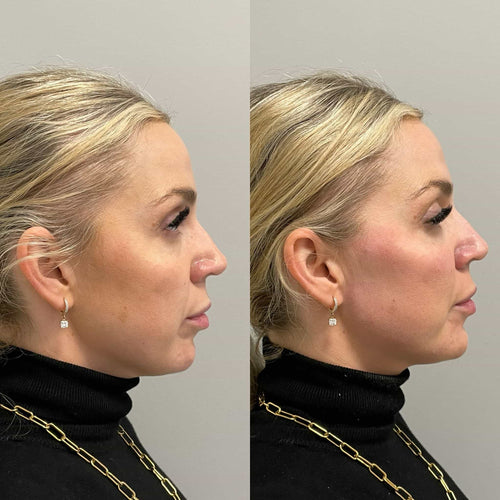Arrange a Consultation for Dermal Fillers with Dr. Laura Geige

## Managing Lip Filler Swelling
Lip filler swelling is a common side effect that typically occurs immediately after treatment and gradually subsides within a few days to a week.
Here are some tips on how to manage lip filler swelling:
1. **Apply Cold Compresses:** Apply cold compresses or ice packs wrapped in a towel to the treated area for 15-20 minutes at a time, several times a day. This helps constrict blood vessels and reduce inflammation.
2. **Elevate Your Head:** Sleep with your head elevated using an extra pillow. This can help drain excess fluid from the lips.
3. **Stay Hydrated:** Drinking plenty of water helps flush out toxins and promotes healing.
4. **Avoid Hot Showers or Baths:** Hot water can increase blood flow and exacerbate swelling. Stick to lukewarm showers or baths.
5. **Don’t Touch or Massage Your Lips:** Avoid touching, rubbing, or massaging your lips, as this can irritate the area and worsen swelling.
6. **Avoid Alcohol and Smoking:** Alcohol and smoking can dehydrate the body and interfere with healing.
7. **Take Over-the-Counter Pain Relievers:** If you experience discomfort, over-the-counter pain relievers such as ibuprofen or acetaminophen may help reduce swelling and inflammation.
8. **Follow Your Practitioner’s Instructions Carefully:** Your lip filler provider will give you specific aftercare instructions. Follow them diligently for optimal healing and to minimize swelling.
**When to Seek Medical Attention:**
If you experience excessive or persistent swelling, severe pain, fever, or any signs of infection, contact your healthcare provider immediately.
The Initial Phase
Ice It Down
Elevate Your Head
Reducing Inflammation
Elevate Your Head
Elevating your head can help reduce swelling after lip fillers by improving lymphatic drainage.
Lymphatic fluid carries away excess fluids and waste products from the body, including those that contribute to swelling. When you lie down, gravity makes it harder for this fluid to drain effectively.
Schedule a Dermal Filler Appointment with Dr. Laura Geige Now
By propping your head up with an extra pillow or two, you can encourage lymphatic fluid to flow back towards the neck and heart.
Reducing Inflammation
Inflammation is a natural response to injury or irritation, and it’s part of the healing process. Lip fillers trigger a mild inflammatory response as your body adjusts to the new substance.
Here are some ways to help reduce inflammation after lip fillers:
-
Cold Compresses: Applying ice packs wrapped in a towel for 15-20 minutes at a time can constrict blood vessels and minimize swelling.
-
Arnica Cream or Gel: Arnica is known for its anti-inflammatory properties and can be applied topically to the area.
-
Over-the-Counter Pain Relievers: Medications like ibuprofen or naproxen can help reduce inflammation and pain.
-
Hydration: Drinking plenty of water helps flush out toxins and promotes healing.
Avoid activities that increase blood flow to your lips, such as strenuous exercise or hot showers, in the first 24-48 hours after getting lip fillers. This can exacerbate swelling.
Be patient; swelling typically subsides within a few days to a week. If you have any concerns about excessive swelling or other side effects, consult with your doctor or the provider who administered your fillers.
Cold Compresses for the Win
Arnica: A Natural Soother
Over-the-Counter Options
LongTerm Care Tips
Swelling after lip filler is a common and usually temporary side effect. While most swelling subsides within a few days to a week, some individuals may experience more prolonged swelling. Over-the-counter (OTC) options can help manage this discomfort.
Here are some OTC remedies that may help reduce lip filler swelling:
-
Cold Compresses: Apply a cold compress or ice pack wrapped in a thin towel to the affected area for 10-15 minutes at a time, several times a day. Cold temperatures constrict blood vessels, which can help reduce inflammation and swelling.
-
Arnica Cream: Arnica is a natural remedy that has been traditionally used to reduce bruising and swelling. Apply an arnica cream or gel topically to the swollen area several times a day.
-
Antihistamines: Over-the-counter antihistamines, such as cetirizine (Zyrtec) or loratadine (Claritin), can help reduce swelling caused by allergic reactions. Consult with a pharmacist to determine the appropriate dosage.
Long-Term Care Tips for Lip Fillers:
-
Hydration: Drink plenty of water throughout the day to help flush out toxins and promote healing.
-
Healthy Diet: Consume a balanced diet rich in fruits, vegetables, and antioxidants to support overall skin health.
-
Avoid Smoking and Alcohol:**
-
Sun Protection: Protect your lips from the sun’s harmful UV rays by wearing a lip balm with SPF 30 or higher.
-
Regular Moisturizing: Keep your lips hydrated by applying a good quality lip balm regularly, especially after swelling has subsided.
Smoking and excessive alcohol consumption can hinder healing and increase the risk of complications.
Schedule a Dermal Filler Session with Dr. Laura Geige
It’s important to remember that everyone heals differently. If you experience excessive or persistent swelling, consult with your doctor or the injector who administered the lip fillers.
Hydration is Key
Avoidance Tactics for Lip Filler Swelling
My Mental Health Rocks Cleveland Relationship Therapy Divine Magazine The Fine Nanny Tattoo Culture Magazine N City Magazine
- Can Lip Fillers Improve Your Confidence? - June 11, 2025
- Playing The Cello – Best Sex Positions - June 9, 2025
- Upper Face Anti Wrinkle Treatment Near Hambledon, Surrey - June 8, 2025
